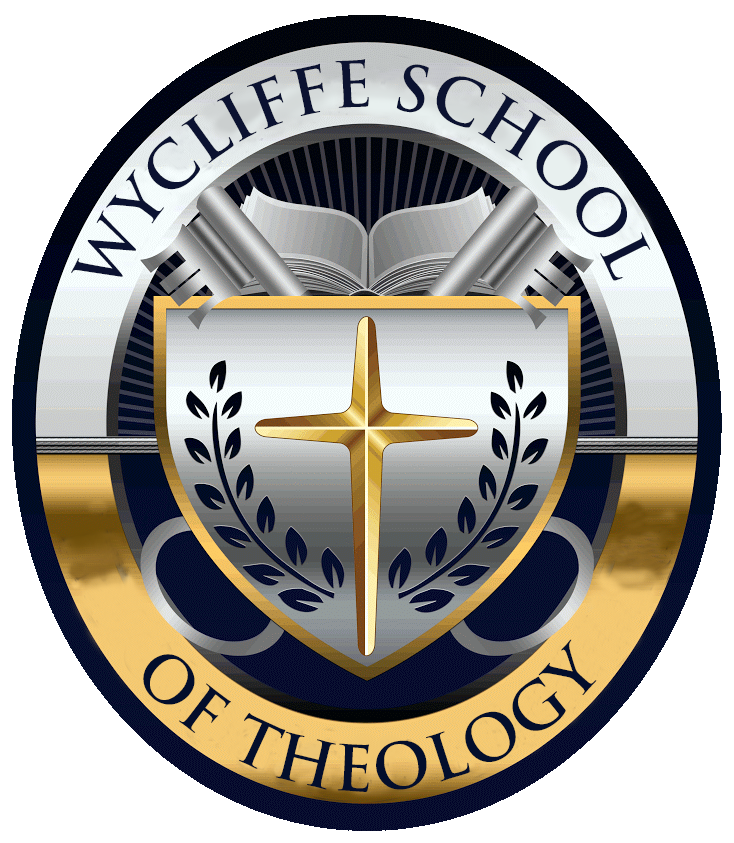Bachelor of Divinity Full Tuition Cost = $1,920.00 When paying in full receive a 10% discount!
_________________________________________________________________
The Bachelor of Divinity (B.Div.) is the first of its kind in the United States. Currently the Bachelor of Divinity degree is a degree previously only offered in England and a few other countries overseas. Wycliffe is again on the cutting edge by offering the Bachelor of Divinity (B.Div.) degree to its students. Usually a student only has the option for a divinity degree at the Masters Level – Master of Divinity (M.Div.); however, Wycliffe has seen the need and created this degree at the Bachelors Level! The academic department has intertwined the Bachelor of Divinity’s (B.Div.) curriculum to prepare students for a Divinity degree at the Masters Level. You will thoroughly enjoy the carefully selected classes in this program that includes Levels I & II of the Hebrew and Greek languages.
The classes in the Bachelor of Divinity (B.Div.) program are focused on Christian Theology, Interpretation, and Biblical Languages within interpretation. They entail the study of Christian scriptures, historical development, world religions, doctrines, and practices. They offer a formation of learning for students preparing for ordained ministry.
This is a 2-year program requiring 64 Credit Hours, however, can be completed in less time depending upon the student’s workload and determination.
YEAR 1 Bachelor of Divinity, B.Div.
Total Credits YEAR 1 = 32 Credits
YEAR 2 Bachelor of Divinity, B.Div.
Total Credits YEAR 2 = 32 Credits
TOTAL PROGRAM = 64 Credits
The following is the course description for the B.Div. Degree: (a 64 credit hour degree program)
YEAR 1 (32 credit hours)
TH-400 Systematic Theology (4 credit hours)
Systematic Theology concentrates on the Christian church and its long tradition of systematic theology, that is, studying theology and doctrine organized around fairly standard categories such as the Word of God, redemption, and Jesus Christ. This introduction to systematic theology covers: – A strong emphasis on the scriptural basis for each doctrine and teaching – Clear writing, with technical terms kept to a minimum – A contemporary approach, treating subjects of special interest to the church today.
BI-410 Interpreting the Pentateuch (4 credit hours)
Interpreting the Pentateuch investigates the first 5 books of the Holy Bible. Divided into three parts, Interpreting the Pentateuch provides an overview of the major themes of the Pentateuch. It provides resources and strategies for interpreting and understanding these books by exploring their genres-law and narrative. It teaches techniques for effective exegesis by including two start-to-finish examples, one from each genre.
BI-420 Interpreting the Historical Books (4 credit hours)
Interpreting the Historical Books will provide students with the valuable tools necessary to understand Old Testament Exegesis. The student will be able to embrace the understanding of different Old Testament genres and strategies for interpretation, explore the components of narrative-setting, characterization, and plot-and then develops the major theological themes in each of the Old Testament historical books (Joshua, Judges, Ruth, 1-2 Samuel, 1-2 Kings, 1-2 Chronicles, Ezra, Nehemiah, and Esther).
BI-430 Interpreting the Prophetic Books (4 credit hours)
Interpreting the Prophetic Books provides students with the necessary tools for enhancing their understanding of different Old Testament genres and strategies for interpretation. It will explore the components of narrative-setting, characterization, and plot-and then develops the major theological themes in each of the Old Testament historical books (Joshua, Judges, Ruth, 1-2 Samuel, 1-2 Kings, 1-2 Chronicles, Ezra, Nehemiah, and Esther).
BI-460 Interpreting Apocalyptic Literature. (4 credit hours)
Interpreting Apocalyptic Literature introduces the student to the apocalyptic genre; surveys the purpose, message, and primary themes of Old Testament apocalyptic literature; and then discusses critical questions and key works for further study. It provides guidelines for interpreting apocalyptic texts, followed by Old Testament passages that serve to illustrate those guidelines.
HB-400 Hebrew I. (4 credit hours)
Hebrew I introduces the student to the wonderful Biblical language of Hebrew.
HB-410 Hebrew II. 4 (4 credit hours)
Hebrew II takes up where Hebrew I leaves off and furthers the student’s understanding of Hebrew.
BI-450 Biblical Counseling. (4 credit hours)
Biblical Counseling unpacks the core theological convictions that underlie sound counseling, and practical wisdom for counseling today. This course covers how biblical counseling is rooted in the Scriptures while illustrating the real challenges counselors face today through true stories from the counseling room.
YEAR 2 (32 credit hours)
TH-460 World Religions (4 credit hours)
World Religions introduces the student to the essential elements and teachings of the world’s predominant faiths, including Hinduism, Buddhism, Confucianism, Taoism, Judaism, Christianity, Islam, as well as regional native traditions.
CH-400 History of the Church (4 credit hours)
History of the Church presents a narrative history of Christianity, from the Early Church to the Dawn of the Protestant Reformation. From Jesus’ faithful apostles to the early reformist John Wycliffe, the student will be able to skillfully trace core theological issues and developments within the various traditions of the church, including major events outside of Europe, such as the Spanish and Portuguese conquest of the New World. This course incorporates recent archaeological discoveries about the life of Early Christian Communities.
BI-460 Interpreting the Pauline Epistles. (4 credit hours)
Interpreting the Pauline Epistles explores the components of narrative, setting, characterization, and plot, then develops the foremost theological themes in each of the books traditionally ascribed to Paul. The method sets the task of exegesis within the literary context of first-century letters as well as the theological context of major themes present in Paul’s letters. This course takes you beyond exegesis to discuss strategies for communicating the central truths of Paul’s first-century messages to a twenty-first-century audience.
BI-470 Interpreting the General Letters. (4 credit hours)
Interpreting the General Letters is designed to be a step-by-step approach for analyzing and communicating eight letters of the New Testament: Hebrews, James, the Petrine Letters, the Johannine Letters, and Jude. It provides important background material for these books’ interpretation by exploring the types and component parts of letter writing, the importance of an amanuensis, the historical background of the Greco-Roman world, and implications of each of these factors for interpreting the general letters.
BI-480 Interpreting Revelation and other apocalyptic literature. (4 credit hours)
Interpreting Revelation and other Apocalyptic Literature considers the background of Old Testament apocalyptic literature, such as Daniel, demonstrating its foundational role for properly understanding the New Testament discussions. It elucidates the tie that binds all apocalyptic writing together; the coming restoration of Israel–before delving into his main emphasis on Revelation and other New Testament writings.
TH-470 New Testament Use of the Old Testament (4 credit hours)
New Testament Use of the Old Testament will serve the student with a concise guide by leading a New Testament scholar to focus on the “how to” of interpreting the use of the Old Testament in the New.
GK-400 Greek I. (4 credit hours)
Greek I introduces the student to the wonderful language of Greek.
GK-410 Greek II. (4 credit hours)
Greek II takes up where Greek I leaves off and furthers the student’s understanding of the Greek language.
_____________________________________________________________________________________________________________________________
Course Features
- Lectures 16
- Quizzes 0
- Duration 64 hours
- Skill level All levels
- Language English
- Students 0
- Assessments Yes
Curriculum
- 2 Sections
- 16 Lessons
- 10 Weeks
- Bachelor of Divinity (YEAR 1)Bachelor of Divinity YEAR 1 (32 Credits)8
- 1.1TH-400 Systematic Theology (4 credit hours)
- 1.2BI-410 Interpreting the Pentateuch (4 credit hours)
- 1.3BI-420 Interpreting the Historical Books (4 credit hours)
- 1.4BI-430 Interpreting the Prophetic Books (4 credit hours)
- 1.5BI-440 Interpreting Apocalyptic Literature (4credit hours)
- 1.6HB-400 Hebrew I (4 credit hours)
- 1.7HB-410 Hebrew II (4 credit hours)
- 1.8BI-450 Biblical Counseling (4 credit hours)
- Bachelor of Divinity (YEAR 2)8
- 2.1TH-460 World Religions (4 Credit Hours)
- 2.2CH-400 History of the Church (4 Credit Hours)
- 2.3BI-460 Interpreting the Pauline Epistles (4 Credit Hours)
- 2.4BI-470 Interpreting the General Letters (4 Credit Hours)
- 2.5BI-480 Interpreting Revelation and other apocalyptic literature (4 Credit Hours)
- 2.6TB-470 New Testament Use of the Old Testament (4 Credit Hours)
- 2.7GK-400 Greek I (4 Credit Hours)
- 2.8GK-410 Greek II (4 Credit Hours)







